The Holy Bible is divided into two Testaments. The OLD Testament and The NEW testament. These Testaments are referred to by a number of people as the OLD and NEW Covenants.
The Old Testament is divided into five sections:
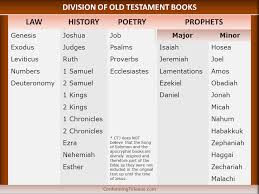
- The Pentateuch (The Law): The Pentateuch deals with the creation of Israel and God establishing a covenant relationship with Israel. (Genesis through Deuteronomy)
- The Historical Books: The historical books record Israel’s history, its victories and successes along with its defeats and failures. (Joshua through Esther)
- The Poetic Books: The poetic books give us a more intimate look at God’s relationship with Israel and His passion for Israel to worship and obey Him. (Job through Song of Solomon)
- The Major Prophets: The Prophetic Books are God’s call to Israel to repent from its idolatry and unfaithfulness and to return to a relationship of obedience and spiritual fidelity. (Isaiah through Daniel)
- The Minor Prophets: The Prophetic Books are God’s call to Israel to repent from its idolatry and unfaithfulness and to return to a relationship of obedience and spiritual fidelity.(Hosea through Malachi)
The Old Testament was written from approximately 1400 B.C. to approximately 400 B.C. The Old Testament was written primarily in Hebrew, with a few small sections written in Aramaic (essentially a variation of Hebrew).

The Old Testament deals primarily with the relationship between God and the nation of Israel.
Perhaps a better title would be the First Testament. The word “old” tends to give the idea of “outdated” or “not-relevant.” That could not be further from the truth.
(The Pentateuch) (The Law)
- Book of Genesis
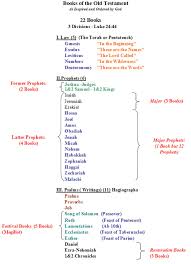
- Book of Exodus
- Book of Leviticus
- Book of Numbers
- Book of Deuteronomy
(The Historical Books)
The historical books record Israel’s history, its victories and successes along with its defeats and failures.
- Book of Joshua
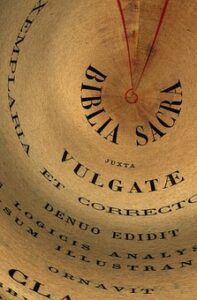
- Book of Judges
- Book of Ruth
- Book of 1 Samuel
- Book of 2 Samuel
- Book of 1 Kings
- Book of 2 Kings
- Book of 1 Chronicles
- Book of 2 Chronicles
- Book of Ezra
- Book of Nehemiah
- Book of Esther
(The Poetic Books)
The poetic books give us a more intimate look at God’s relationship with Israel and His passion for Israel to worship and obey Him.
 Book of Job
Book of Job- Book of Psalms
- Book of Proverbs
- Book of Ecclesiastes
- Song of Solomon
(The Major Prophets)
 Book of Isaiah
Book of Isaiah- Book of Jeremiah
- Book of Lamentations
- Book of Ezekiel
- Book of Daniel
(The Minor Prophets)
- Book of Hosea
- Book of Joel
- Book of Amos
- Book of Obadiah
- Book of Jonah
- Book of Micah
- Book of Nahum
- Book of Habakkuk
- Book of Zephaniah
- Book of Haggai
- Book of Zechariah
- Book of Malachi

The Authors – The Old Testament Books
- GENESIS: (The book of beginnings) Written by Moses, the Shepherd of GOD’S People.
- EXODUS: (The rescue of Abraham’s children from Egyptian slavery) Written by Moses, the Shepherd of GOD’S People.
- LEVITICUS: (The shape of worship) Written by Moses, the Shepherd of GOD’S People.
- NUMBERS: (The journey in the wilderness) Written by Moses, the Shepherd of GOD’S People.
- DEUTERONOMY: (Farewell to Moses) Written by Moses, the Shepherd of GOD’S People.
- JOSHUA: (Entering the promised land) Written by Joshua, who spied out the land.
- JUDGES: (The period after Joshua and before the kings of Israel) Written by Samuel and/or Others.
- RUTH: (The struggles of one Jewish widow and her daughter-in-law) Written by an Unknown Author.
- 1ST SAMUEL: (Israel has its first king and the troubles that follow) Written by Samuel, a prophet of Israel.
- 2ND SAMUEL: (From Saul to David with great tragedy and loss) Written by Samuel, a prophet of Israel.
- 1ST KINGS: (History of the kings of Israel and Judah, from Solomon through Ahab) Compiled by Jewish Scribes in exile.
- 2ND KINGS: (History of the kings of Israel and Judah, from Ahaziah through Jehoiachin) Compiled by Jewish Scribes in exile.
- 1ST CHRONICLES: (A history from Saul through David written for the Jews after their exile) Written by an Unknown Chronicler, possibly Ezra, the Priest, who came out of exile.
- 2ND CHRONICLES: (A history from Solomon through Cyrus written for the Jews after their exile) Written by an Unknown Chronicler, possibly Ezra, the Priest, who came out of exile.
- EZRA: (The Jews return to the land of promise) Written by Ezra, the Priest.
- NEHEMIAH: (A personal memoir of rebuilding Jerusalem’s walls) Written by Nehemiah, a leader with great vision.
- ESTHER: (The Jews are rescued from certain annihilation by a brave young queen) Written by an unknown Jew living in Persia.
- JOB: (Job’s devotion to God is tested) Written by an unknown author.
- PSALMS: (The collected psalms to be sung or read in worship) Written by David and other gifted musicians.
- PROVERBS: (Collected practical wisdom for everyday guidance) Written by Solomon and other gifted sages.
- ECCLESIASTES: (Wise reflections on life) Written by the wise teacher of Israel.
- SONG OF SOLOMON: (A love song about the Shulammite and her lover) Written for Solomon, king of Israel.
- ISAIAH: (Prophecies concerning God’s judgment and salvation) Written message of Isaiah, a prophet and servant of God.
- JEREMIAH: (Oracles of judgment and restoration regarding Judah and Israel) Written message of Jeremiah, the weeping prophet.
- LAMENTATIONS: (A communal response to the fall of Jerusalem) Written by Jeremiah, the heartbroken prophet.
- EZEKIEL: (Judah is taken into exile) Written message of Ezekiel, a prophet of God.
- DANIEL: (Stories and visions of freedom and faithfulness for a nation in captivity) Written story of Daniel, a wise man who found favor.
- HOSEA: (God’s faithfulness expressed though Hosea’s family) Written message of Hosea, a prophet of consolation.
- JOEL: (The day of the Eternal is near) Written message of Joel, the son of Pethuel.
- AMOS: (The judgment of God and the call for justice) Written message of Amos, the shepherd and orchard worker.
- OBADIAH: (God’s judgment on Edom for its cruelty) Written message of Obadiah, a servant of God.
- JONAH: (God extends His mercy to other nations) Written story of Jonah, an unmerciful prophet.
- MICAH: (Sin, judgment, and hope for redemption) Written message of Micah, a prophet from the country.
- NAHUM: (The destruction of Nineveh) Written message of Nahum, a prophet from Elkosh.
- HABAKKUK: (A crisis of faith in light of Judah’s impending destruction) Written message of Habakkuk, a prophet.
- ZEPHANIAH: (The day of the Eternal One is near) Written message of Zephaniah, a prophet from Jerusalem.
- HAGGAI: (Rebuild God’s house and experience His blessing) Written message of Haggai, a contemporary of Zechariah.
- ZECHARIAH: (Visions and oracles of Jerusalem, her king, and her future) Written message of Zechariah, a priest and prophet who returned from Babylon.
- MALACHI: (A call to remain faithful to God) Written message of Malachi, a prophet.

The New Testament is divided into five sections:
- The Gospels (Matthew through John).
- The Historical Book (the book of Acts).
- The Pauline Epistles (Romans through Philemon).
- The General Epistles (Hebrews through Jude).
- The Prophetic Book (the book of Revelation).
The New Testament was written from approximately A.D. 45 to approximately A.D. 95. The New Testament was written in Koine Greek (common Greek, the everyday form of the Greek language in the first century A.D.)

The Gospels give us four different, yet not conflicting, accounts of the birth, life, ministry, death, and resurrection of Jesus Christ. The Gospels demonstrate how Jesus was the promised Messiah of the Old Testament and lay the foundation for the teaching of the rest of the New Testament.
The book of Acts records the deeds of Jesus’ apostles, the men Jesus sent out into the world to proclaim the Gospel of salvation. Acts tells us of the beginning of the church and its rapid growth in the first century A.D.
The Pauline Epistles, written by the Apostle Paul, are letters to specific churches – giving official Christian doctrine and the practice that should follow that doctrine.
The General Epistles compliment the Pauline Epistles with additional teaching and application.
The book of Revelation prophesies the events that will occur in the end times.
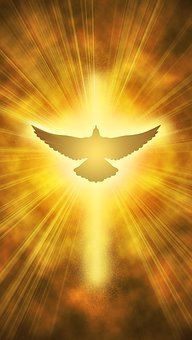
(The Books of The Gospels)
The Gospels give us four different, yet not conflicting, accounts of the birth, life, ministry, death, and resurrection of Jesus Christ. The Gospels demonstrate how Jesus was the promised Messiah of the Old Testament and lay the foundation for the teaching of the rest of the New Testament.
- Gospel of Matthew
- Gospel of Mark
- Gospel of Luke
- Gospel of John
(The Historical Book)
The book of Acts records the deeds of Jesus’ apostles, the men Jesus sent out into the world to proclaim the Gospel of salvation. Acts tells us of the beginning of the church and its rapid growth in the first century A.D.
- Book of Acts
(The Pauline Epistles)
The Pauline Epistles, written by the Apostle Paul, are letters to specific churches – giving official Christian doctrine and the practice that should follow that doctrine.
- Book of Romans
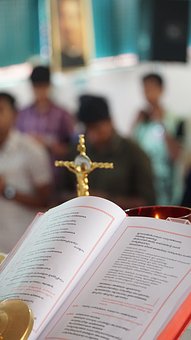
- Book of 1 Corinthians
- Book of 2 Corinthians
- Book of Galatians
- Book of Ephesians
- Book of Philippians
- Book of Colossians
- Book of 1 Thessalonians
- Book of 2 Thessalonians
- Book of 1 Timothy
- Book of 2 Timothy
- Book of Titus
- Book of Philemon
(The General Epistles)
The General Epistles compliment the Pauline Epistles with additional teaching and application. 
- Book of Hebrews
- Book of James
- Book of 1 Peter
- Book of 2 Peter
- Book of 1 John
- Book of 2 John
- Book of 3 John
- Book of Jude
(The Prophetic Book)
The book of Revelation prophesies the events that will occur in the end times.
- Book of Revelation
The Authors – The New Testament Books
- MATTHEW: (Royal lineage of Jesus of Nazareth) Written by Matthew, the apostle.
- MARK: (Record of the servant of God) Written by Mark, a follower of Jesus.
- LUKE: (Carefully researched account of God’s Anointed) Written by Luke, the physician.
- JOHN: (Visitation of God’s Son) Written by John, the apostle.

- ACTS: (History of the early church) Written by Luke, the physician.

- ROMANS: (Letter to the church in Rome) Written by Paul, the apostle to the Gentiles.
- 1ST CORINTHIANS: (Letter to the church in Corinth) Written Letter to the church in Corinth, from Paul, the apostle to the Gentiles.
- 2ND CORINTHIANS: (Letter to the church in Corinth) Written Letter to the church in Corinth, from Paul, the apostle to the Gentiles.
- GALATIANS: (Letter to the churches of Galatia) Written Letter to the churches of Galatia, from Paul, the apostle to the Gentiles.
- EPHESIANS: (Letter to the church in Ephesus) Written Letter to the church in Ephesus from Paul, the apostle to the Gentiles.
- PHILIPPIANS: (Letter to the church in Philippi) Written Letter to the church in Philippi from Paul, the apostle to the Gentiles.
- COLOSSIANS: (Letter to the church in Colossae) Written Letter to the church in Colossae from Paul, the apostle to the Gentiles.
- 1ST THESSALONIANS: (Letter to the church in Thessalonica) Written Letter to the church in Thessalonica from Paul, the apostle to the Gentiles.
- 2ND THESSALONIANS: (Letter to the church in Thessalonica) Written Letter to the church in Thessalonica from Paul, the apostle to the Gentiles.
- 1ST TIMOTHY: (Personal letter to Timothy from Paul) Written Personal letter to Timothy from Paul, the apostle to the Gentiles.
- 2ND TIMOTHY: (Personal letter to Timothy from Paul) Written Personal letter to Timothy from Paul, the apostle to the Gentiles.
- TITUS: (Personal letter to Titus from Paul) Written Personal letter to Titus from Paul, the apostle to the Gentiles.
- PHILEMON: (Personal letter to Philemon of Colossae from Paul) Written Personal letter to Philemon of Colossae from Paul, the apostle to the Gentiles.

- HEBREWS: (Instruction to Jewish believers) Written Instruction to Jewish believers from a leader in the early church.
- JAMES: (Letter to Jewish believers) Written Letter to Jewish believers from James, the brother of Jesus.
- 1ST PETER: (Instruction to the church scattered) Written Instruction to the church scattered from Peter, the apostle to Jewish Christians.
- 2ND PETER: (Instruction to the church scattered) Written Instruction to the church scattered from Peter, the apostle to Jewish Christians.
- 1ST JOHN: (Instructions to believers everywhere) Written Instructions to believers everywhere from John, the apostle.
- 2ND JOHN: (Letter to a lady and her children) Written Letter to a lady and her children from John, the apostle.
- 3RD JOHN: (Letter to believers in the first century) Written Letter to believers in the first century from John, the apostle.
- JUDE: (Letter to Christians everywhere) Written Letter to Christians everywhere from Jude, a Christian leader.

- REVELATION: (Letter to the seven churches) Written Letter to the seven churches from John, the apostle.

I really hope you have enjoyed this page, if you have any questions or want to leave your own personal post, please leave your comments below in the comments box.
I hope that you have really enjoyed this post,
Please Leave All Comments in the Comment Box Below ↓

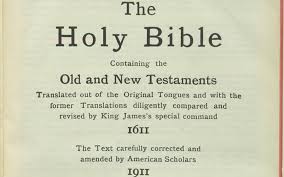











This was a very thorough run-through of the books that make up the Holy Bible.
My husband studied for the ministry and part of his studies included learning Hebrew, it took him two years to complete, but he really enjoyed it. The two years were not for the degree, just the Hebrew part that took him longer to learn. His degree was a Bachelor of Theology, after which he did a further two years studying before he qualified as a minister.
He ministered for 35years before retirement.
Before going to study he worked in a bank and we already had a child when he went back to University. This meant me being the breadwinner for the time he studied. It was a wonderful experience for us both.
Fortunately, he had outstanding lecturers and loved Biblical Studies.
Thank you Jill,
for taking the time to review my post, I am going to continue to make updates to it as time goes on. Feel free to check back anytime.
It sounds like your husband contains a wealth of knowledge. He sounds wise and very experienced in ministry.
Again thank you for taking the time to review my post,
All The Best To You and Your Family!!!
Jerry
Thanks a lot for a great walk-through on the Bible. The overview and description you gave on the 66 books are very helpful.
To be honest, my Bible college teacher advised me to by-heart all the 66 book names in the Bible. The reason for his advice is because I was searching and not sure where the book AMOS comes in the old testament.
I am bookmarking your post, and with the help of your article, I believe I can learn and remember the 66 books names easily. The information you shared on the law, historical, poetic, major & minor prophets books is informative. I thank GOD for this amazing website and for this helpful article.
Thank you so much Paul,
for allowing my website to be an informative tool in your bookmarks. This is exactly why I created this website, to help people. I am glad to be of help to you.
I remember times when this information was questions to me. Over time through reading, studying, and taking notes on this information, it dawned on me that I should be sharing what I learned not keeping it to myself.
This is a wonderful platform for me to be the vessel and pass on the Good News!
Thank You Again Paul for taking the time to read and study this material. I am going to continue to make updates to it as time goes on. Make sure you “Refresh” your pages each time to see the latest updates.
Jerry
As I renew my faith and my lost habit of reading the Bible, I find this article helpful in understanding the Bible. I tend to forget things easily so I will bookmark this for easy access the next time I need to refresh myself of your outline. This is a good outline that gives us an easy overview of the sections and sub-sections of the Bible.
When I was in my elementary years, we grew up in the care of our grandfather who was a Bible expert when he was still alive. I remember, it was the only book that we have in the countryside so we got no choice but to read it and use our imagination to understand more of the stories told. I was familiarized with the events from Genesis to the time when Israelites were captured by King Nebuchadnezzar. But after their capture, I lost connection with the Bible as I became so busy with my high school studies.
Now that I am gaining interest again in reading the Bible, finding this article is timely as I need a reference like this. Thank you so much and may God bless you a lot!
Thank you greatly Gomer,
for allowing this information to be a refresher of knowledge you already posses. There was a time in my life when I also got too busy with life’s distractions and lost my habit of reading the Holy Bible. Now, I have this information to refer to now anytime I want, however this platform assist anyone who wants to study the Holy Bible in their studies.
I am going to continue to make updates to it as time goes on. Please make sure you “Refresh” your pages each time to see the latest updates.
Again, thank you for allowing this information to be a refresher of knowledge,
Jerry
Every time I think of the authors of the books of the bible, I know deep in my heart that it can only be God.
How can many people create stories that relate to themselves perfectly and exist in different times?
It amazes me and portrays the efficacy of the power and strength of the highest. It is not just instructional material but the direct Word of God.
Hello,
Thank you for your comment.
The thing about the Books of The Holy Bible are, they are not created stories, these stories are about the lives of real people who actually existed during that time period.
The Application of these Real Life events to every time period is what makes the Holy Bible so extraordinary.
Thanks again for opening this discussion.
Have A Great Day,
Jerry
Hello my friend and thank you for this article on the different books that are in the Holy Bible.
I wonder, why is it that you do not have books included that are from the Greek Old Testament?
There are some interesting things that one can learn from the book of Tobit and the two Maccabees books.
Hello,
Thanks for taking the time to stop by.
This website is focused on studying the Books of The Holy Bible, however any information in the Holy Bible that mentions the book of Tobit and the Maccabees are included in this study.
Thank you for wondering, in this life we are all wondering, that is why these type of studies are so important.
Blessings,
Jerry